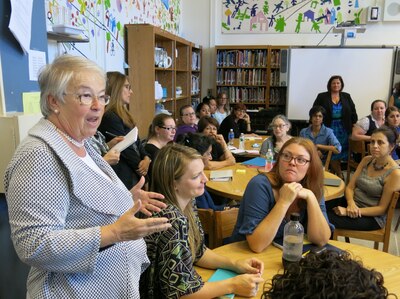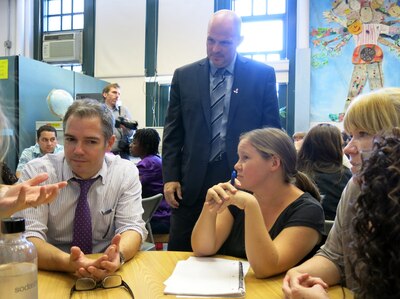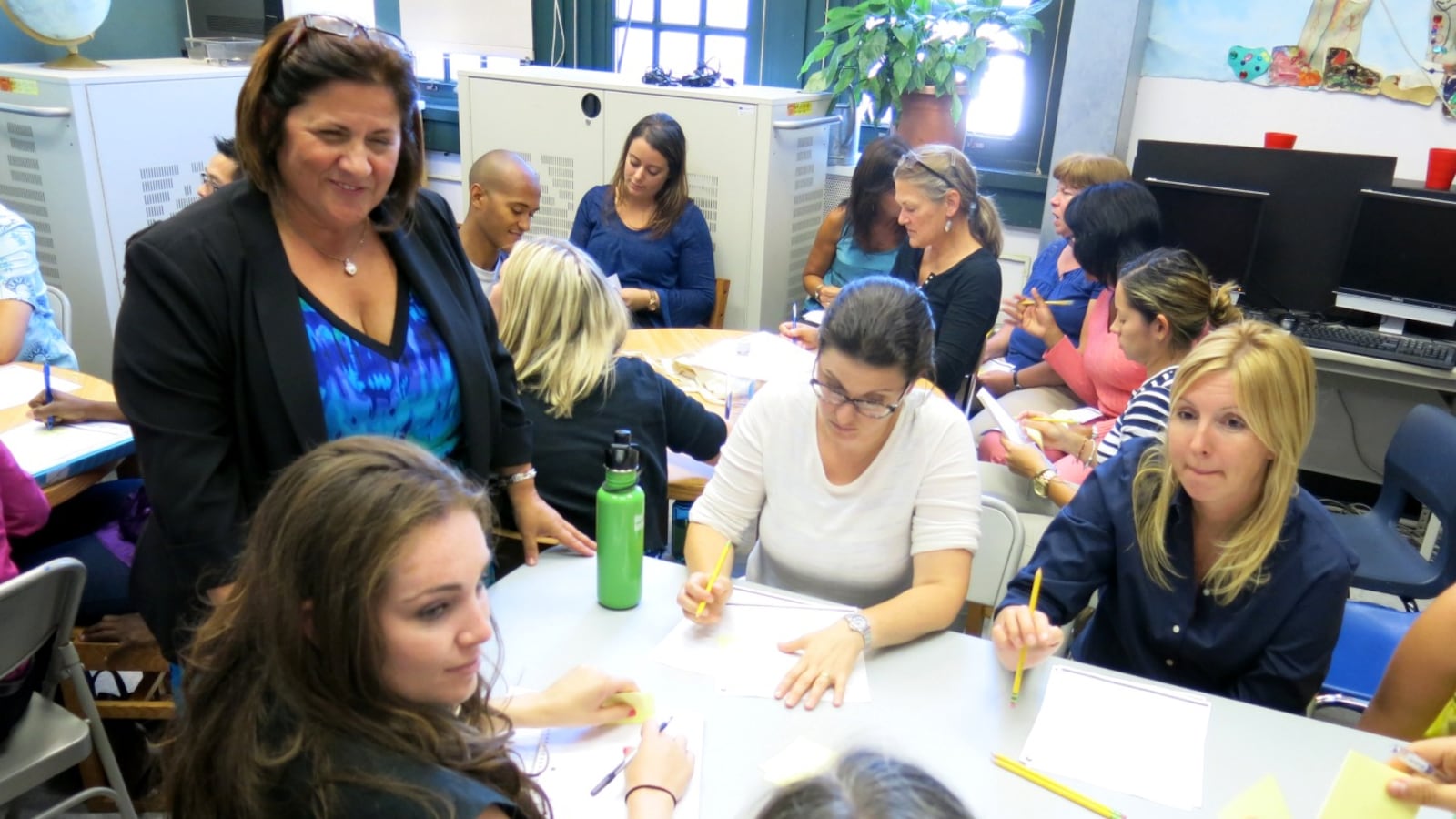After years of meeting over lunch and between bells, the city’s teachers now have 80 uninterrupted minutes every Monday afternoon to collaborate and train.
Committees at most schools are still figuring out how to spend the weekly sessions, which were mandated by the new teachers contract and are the cornerstone of Chancellor Carmen Fariña’s plan to uplift the school system. But some schools have already decided to set aside the time for teacher-led workshops on topics from technology to special education, education book clubs, viewings of peers’ videotaped lessons, and visits to other schools, according to interviews with educators at a dozen schools.
That diversity is by design. The education department released a “professional learning” handbook for principals this month with ideas for the Monday sessions, and the teachers union posted similar guides on its website. But beyond that, schools have been left to plan on their own.
“We’re making this up as we go,” said Genevieve Stanislaus, principal of Life Sciences Secondary School on the Upper East Side.
During a visit to P.S. 295 in Park Slope on Monday, city teachers union president Michael Mulgrew contrasted that approach with the “canned” trainings he said the previous administration paid outside consultants to develop and “force down everyone’s throat.” Fariña added that training is more effective when it’s ongoing and designed by people familiar with the needs inside a particular school — that is, by teachers.
“You don’t need to bring a consultant in who gets paid a lot of money to tell you what the best things are for your kids,” she told the teachers.

But the homemade trainings have also put a new burden on schools, some of which are further along than others in planning their Monday sessions. One principal said she personally created a list of training options after her staff-development team requested one. Judith Glazer, a teacher at I.S. 125 in Queens who is her school’s union representative, said she and some teacher volunteers were surprised by the work required to plan weekly trainings.
“It’s very overwhelming,” she said, adding that the team has decided to schedule the trainings one month at a time rather than for the whole year. (Fariña said Monday that schools could ask the department for planning help or partner with neighboring schools.)
I.S. 125’s planning committee asked teachers to choose from a list of training topics on an online form — including how to manage student behavior, lead classroom discussions, or teach students to “close read” texts — or they could suggest their own topics, according to Glazer. This month, teachers will be trained to use a new electronic grading system and a new literacy program.
Other schools are organizing study groups based on topics their staffers suggested, or workshops that will be led by teachers or outside trainers. I.S. 49 in Staten Island, for instance, invited mental-health workers this month to instruct teachers in how to handle the stresses of the job, according to principal Linda Hill. Still other schools say that teachers will work together during this time to analyze student work, develop course plans, or visit educators at different schools to swap ideas.
At Brooklyn’s P.S. 206, a team surveyed teachers to identify more than a dozen topics for peer-led study groups, according to principal Deirdre Keyes. For 40 minutes each week, teachers will read and talk about how to manage students with attention deficit hyperactivity disorder or autism, ask deeper questions, and take full advantage of interactive whiteboards, among other topics.
Some schools, including ones with staggered start times, are not required to have the 80-minute Monday sessions. But the new teachers contract still encourages them to schedule regular trainings.
The staff at Queens Metropolitan High School, for instance, did that by voting for group meetings on Wednesdays and smaller, targeted sessions on Mondays, according to teacher Chris Fazio. One Monday option is a “teacher video club” where colleagues critique one another’s recorded lessons.
The new teacher-collaboration time has come at a cost.

Some schools had to start and end their days earlier, angering some parents and teachers who commute long distances. Schools have also scrambled to find new time to tutor students, since the weekly staff-development sessions replace time in the contract reserved for working with small groups of students.
Other schools adjusted class lengths to accommodate the after-school staff meetings. The High School for Math, Science and Engineering, for instance, shortened each class on Monday by 20 minutes, according to teacher Mark Hesse. Some educators have questioned the wisdom of that tradeoff and whether every school will manage to make good use of the new training time.
Without the mandated tutoring time, some teachers said they will try to pull aside students during the school day for extra help, while others said they will use more flexible after-school work time on Tuesdays for tutoring. Still, students will not get as much individual support outside of class as they did before, some educators said.
“Of course it won’t be enough time,” said Stanislaus, the Life Sciences Secondary School principal. Students “used to have four days [of tutoring] and now they have one day.”
Already, some teachers are worried that the Monday sessions could devolve from teacher-collaboration time into tedious faculty meetings or assigned-work periods.
Arthur Goldstein, a teacher and union representative at Francis Lewis High School in Queens, said he has heard of one school where teachers were told to create curriculum materials during that period and another where staffers sat through a long presentation on the teacher-evaluation system.
“I just don’t have faith that all of a sudden these get-togethers are going to magically become inspiring,” said Goldstein. His school is not required to hold the weekly sessions, and he said he’s received “precisely zero requests” from teachers to add them.
But during their visit to P.S. 295, Fariña and Mulgrew both insisted that the educator-led trainings would benefit students by raising the caliber of teaching across the city. Linda Mazza, the school’s principal, seconded that idea.
“If you help teachers better their practice,” she said, “students will be more successful in the classroom.”


